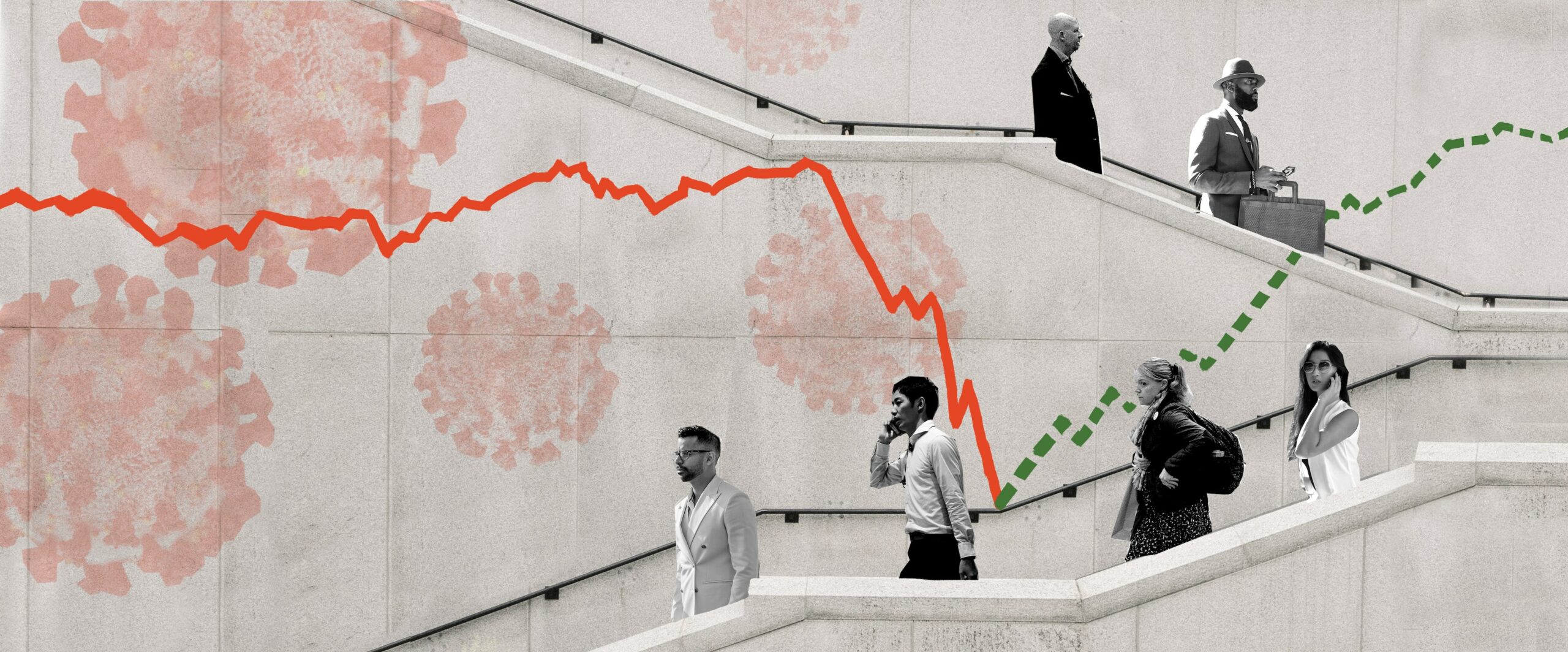Sandra Peter and Kai RiemerSandra Peter, Kai Riemer,
text

Gen Z on Corona Business Insights
Why is Gen Z struggling: from the financial uncertainty, careers and fragility, to counterintuitive effects of the COVID-19 pandemic on the ‘digital native’ generation.
As COVID-19 sets out to change the world forever, join Sandra Peter and Kai Riemer as they think about what’s to come in the future of business.
Shownotes
COVID-19 financial crisis will leave lasting scars on Gen Z
Our previous discussion on motivation on Corona Business Insights
How Gen Z and Millennials spend their time according to BCG
It will be harder for Gen Z to climb the career ladder after a crisis
Young people’s real incomes have fallen since the global financial crisis
Young people will suffer their entire working lives from COVID-19
This episode is part of a podcast series covering what COVID-19 will mean for the business world, where we look at the impact on the economy, businesses, industries, workers and society. This is part of our ongoing coverage of the impact of COVID-19 on the future of business.
Follow the show on Apple Podcasts, Spotify, Overcast, Google Podcasts, Pocket Casts or wherever you get your podcasts. You can follow Sydney Business Insights on Flipboard, LinkedIn, Twitter and WeChat to keep updated with our latest insights.
Send us your news ideas to sbi@sydney.edu.au.
Dr Sandra Peter is the Director of Sydney Executive Plus at the University of Sydney Business School. Her research and practice focuses on engaging with the future in productive ways, and the impact of emerging technologies on business and society.
Kai Riemer is Professor of Information Technology and Organisation, and Director of Sydney Executive Plus at the University of Sydney Business School. Kai's research interest is in Disruptive Technologies, Enterprise Social Media, Virtual Work, Collaborative Technologies and the Philosophy of Technology.
Share
We believe in open and honest access to knowledge. We use a Creative Commons Attribution NoDerivatives licence for our articles and podcasts, so you can republish them for free, online or in print.
Transcript
This transcript is the product of an artificial intelligence - human collaboration. Any mistakes are the human's fault. (Just saying. Accurately yours, AI)
Intro From the University of Sydney Business School, this is Sydney Business Insights.
Sandra And this is Corona Business Insights. I'm Sandra Peter.
Kai And I'm Kai Riemer.
Sandra And with everything that's happening, it's been difficult to understand what COVID-19 might mean for the business world.
Kai So in this series, we've been unpacking its impact on business, the economy, industry, government, workers and society and looking at the effects of the pandemic.
Sandra And this podcast is part of a larger initiative by the University of Sydney Business School. You can find our COVID business impact dashboard online at sbi.sydney.edu.au/coronavirus.
Kai And today we talk about the impact of the COVID-19 pandemic on Generation Z.
Sandra Gen Zed, or Gen Zee, as it's also known, is loosely describing people who are born after 1995 and up until about 2010. And this is of course, in contrast with the Millennials who are those born after in the 1980s, who come after Gen X and the Baby Boomers.
Kai And I know better than making any assumptions about your age, but I'm part of Gen X which is the generation before the Millennials, and Millennials are the first generation who have grown up on the internet, but Gen Z are often touted as the true 'digital natives'.
Sandra So we thought today we'd unpack the effects of the COVID-19 pandemic, specifically on Gen Z. And whilst we'll certainly talk about the economic implications the financial uncertainty, the career prospects of Gen Z, there are a couple of counterintuitive effects and we thought we'll start with those.
Kai So as digital natives, Gen Z is often assumed to be the generation that will do best under the conditions that we're facing, moving to remote work, digital work, working from home using tech to do your work.
Sandra So they're often described as the generation that was exposed for their entire lives to internet, for most of their lives to social networks and to mobile devices. And this is assumed to have produced a generation that would thrive under conditions that rely on those technologies or on digital environments. But interestingly, that has not quite been the case.
Kai So there's recent research coming out of Microsoft, where the company has done some in-depth research on its own workforce, and they are moved to full remote or working from home. And what Microsoft has found is that it is actually the younger generations who are struggling the most with working from home, in particular when it comes to balancing the personal responsibilities at home with the work responsibilities. And while we can assume that younger generations are tech savvy enough not to struggle with that aspect, it is aspects of motivating yourself, of trying to uphold boundaries between work life and personal life. You know, working long hours we've previously mentioned on the podcast that many workers find it hard to switch off, they work longer hours during the day, and we've also just covered motivation on a recent episode. So it is the social aspects that these younger generation seem to struggle with much more so than the older generations.
Sandra And as always, we'll of course, put all those links in the shownotes. But there's another aspect of Gen Z working from home that might prove to be quite problematic in the long run. And that is most of these people are at the start of their careers, at times when they should be networking where they should be building connections, all of which are much harder to do online.
Kai So people who've been in their jobs for quite a while, who've been in their careers for quite a while can draw on a larger network of contacts, of people, both in their organisations and more broadly. But when you're just starting out, you've just entered the workplace, it is so important to have those accidental informal contacts with people in the office, in the corridors, at the water cooler, the coffee machine. And it is really also those aspects that Gen Z, that younger employees who are fresh out of uni into their first job are missing out on as we have moved to the isolation of working from home.
Sandra But there is another reason why Gen Z might be less equipped than other generations to deal with the effects of the pandemic. And we want to draw here on the work of Jonathan Haidt from NYU, and we'll include a longer interview with Jonathan in the shownotes. But he points out the fact that this generation is different to Millennials in that they have grown up in a culture of moral safetyism. This is the age of helicopter parenting when even though the world is much safer than at any other point in history, kids are being perceived as fragile and in need of protection from dangerous ideas, from dangerous speakers. This is also the age of the call-out culture, of vast over-protections, but also the age where an entire generation has grown up on social media. Compared with Millennials for whom social media was a late addition, for Gen Z this has come very early in their lives, so 2007 with the start of Facebook, and 2009 with the start of the 'like' button, their exposure to social media has been a constant part of their lives. Hence Gen Z is also the generation that reports the highest levels of depression of anxiety and suicide of any of the previous generations.
Kai And we shouldn't forget that Jonathan Haidt is a psychologist by training, so he actually came to this topic through the observation that this generation has a significantly higher rate of anxiety and mental health problems. And in his research, he traced it back to the exposure to social media, to being constantly in social competition with their peers and you know, living their lives on social media, being exposed to all the problems of their peers, often making those problems their own problems, and in the process in the combination of being overprotective through parenting and the exposure to social media growing up as a generation that, as he says lacks resilience.
Sandra And is less prepared than other generations to have the hard conversations, to deal with ambiguity, with uncertainty and with difficulties in life. And this is becoming particularly important now where we are facing not only a time of financial uncertainty but also one of isolation due to lockdowns, due to the rise of remote work, and one when the use of social media is actually on the rise. And for Gen Z 60% have increased the time they spent on social media compared to only about 40% in other generations, and we'll include research from BCG on the topic in the shownotes.
Kai And of course, we should make a disclaimer at this point that these are sweeping statements about entire generations. But the point here is that there is a strong effect on average, and the percentage of people who report increases in mental health problems in this particular generation, Generation Z, is much, much higher than in previous generations. Not only do they start out with a higher rate of anxiety and mental health issues, the pandemic then has spurred this on. And there's research coming out of Swinburne University, which shows that depression scores, for example, for 18 to 25 year olds, almost four times higher than usual for the age group during this pandemic. And it's nearly as bad for anxiety and perceived stress.
Sandra And so these are the conditions under which Gen Z then enters the financial uncertainty and the long term economic impacts of the COVID-19 crisis. And they've been hit quite hard on that front as well as they're trying to start their careers and as they're starting to build their wealth. Already we know that unemployment rates for teenagers 16 to 19, peaked in April at about 31%, which was double the national average. In the US college graduates were on track to enter one of the best job markets in US history, just landed in the worst job market in US history. And here in Australia, about a quarter of younger Australians don't qualify for wage subsidy packages because they are on casual contracts, or because many of them are just starting out and they've been employed for less than 12 months. And that's about a quarter compared to about 6.5 overall for other age groups.
Kai And so the unemployment rate among 15 to 24 year olds is reported to have surged to 16.1% compared to about 5.5% for those over 25. And that is of course, because many young people find themselves in precarious work situations, and internships, in casual work, in gig work, and are not protected by JobKeeper here in Australia.
Sandra And to add to that, the recent Productivity Commission report found that works young people would be scarcer, taking on lower quality jobs early on was likely to have long-term consequences for their career development. So we know that after the global financial crisis, people who were just starting out their careers were impacted long-term in their ability to build their careers and their ability to build their wealth, we expect a similar effect after the COVID pandemic.
Kai So Millennials, the generation that came into their first jobs that started their careers in 2008/9/10, in and after the financial crisis, have lost an estimated 13% of their earnings carried forward, so over their lifetime, as a result of starting out their career at a lower rung of the ladder. And research has shown that people who had to start out their careers in jobs that were below what they qualified for, on average, found it hard to catch up over their careers, thus far. So there's now real worries that not only do Millennials face the short-term prospect of unemployment and not finding a job, but that when they start out their careers, that there might be compounding effects and that they might be hit for the decades to come.
Sandra And indeed, as Gen Z finds it more difficult to find jobs or indeed are losing their jobs, one of the expectations is that many of these people will extend their studies or go back to study. However, that just seems to be moving the problem further along. As many of a generation tried to do this, there is a much more fierce competition awaiting them at the other end.
Kai So where does this leave Generation Z, or at least those of Generation Z that that are making their way into their work lives right now?
Sandra It leaves them in a place where both governments and employers need to pay particular attention to these groups and recognise that they might need additional support or a different kind of support and for different periods of time than other groups.
Kai So employers for example, shouldn't just assume that those young employees who've just joined the organisation are fine just by virtue of knowing how to work the technology.
Sandra This is where we want to leave it today.
Kai This has been Corona Business Insights.
Sandra Until next time, let's cut Gen Z some slack.
Kai Thanks for listening.
Sandra Thanks for listening.
Outro From the University of Sydney Business School, this is Sydney Business Insights, the podcast that explores the future of business.
Close transcript







